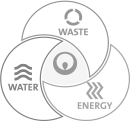Influenza (flu) is a serious, contagious disease that can lead to hospitalization and even death.
Flu-like symptoms include fever, cough, sore throat, runny or stuffy nose, body aches, headache, chills and fatigue. Some people may also have vomiting and diarrhea. People may be infected with the flu and have respiratory symptoms without a fever.
The Centers for Disease Control and Prevention (CDC) urges you to take the following actions to protect yourself and others from the flu.
GET A FLU VACCINE
- CDC recommends a yearly flu vaccine as the first and most important step in protecting against flu viruses. Many health plans pay for flu vaccinations at 100% meaning you pay nothing out of pocket. Check with yours to see what coverage is provided.
- While there are many different flu viruses, a flu vaccine protects against three viruses that research suggests will be most common.
- Everyone 6 months of age and older should get a flu vaccine as soon as the current season's vaccines are available.
- Vaccination of high-risk persons is especially important to decrease their risk of severe flu illness. People at high risk of serious flu complications include young children, pregnant women, people with chronic health conditions like asthma, diabetes or heart and lung disease and people 65 years and older.
- Vaccination also is important for people who live with or care for high-risk people to keep from spreading flu to other high-risk people.
- Children younger than 6 months are at high risk of serious flu illness but are too young to be vaccinated. People who care for them should be vaccinated instead.
EVERYDAY PREVENTATIVE ACTIONS
- Try to avoid close contact with sick people and if you are sick, limit contact with others as much as possible to keep from infecting them.
- Cover your nose and mouth with a tissue when you cough or sneeze. Throw the tissue in the trash after you use it. If no tissue is available, cough or sneeze into the inside of your elbow, not your hands.
- Wash your hands often with soap and water. If soap and water are not available, use an alcohol-based hand rub.
- Avoid touching your eyes, nose and mouth. Germs spread this way.
- Clean and disinfect surfaces and objects that may be contaminated with germs like the flu.
ANTIVIRAL MEDICINES
If you get the flu, antiviral drugs can treat your illness.
Antiviral drugs are different from antibiotics. They are prescription medicines (pills, liquid or an inhaled powder and are not available over-the-counter. Follow your doctor's instructions for taking these drugs.
Antiviral drugs can make illness milder and shorten the time you are sick. They may also prevent serious flu complications.
This information is provided by Veolia North America to help you protect your personal safety. Content is drawn from the CDC and other online safety resources.

Veolia is uniquely positioned to service industry, government and commercial entities in improving performance, managing water, waste and energy.
Learn how


